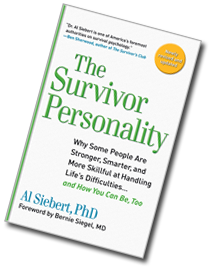The Gift of Blindness *
by Al Siebert, PhD
THRIVEnet Story of the Month - August, 1996
Michael Tapia discovered he had CMV in 1993 when he temporarily lost his sight because of medications he was prescribed for AIDS. Fifty percent of the general population carry the CMV virus, but a healthy immune system suppresses the virus and it typically never develops into a problem. CMV is on the rise in the AIDS community, however, affecting a high percentage of people living with AIDS.
Tapia regained his sight temporarily and was able to function normally for awhile, but the quality of his vision slowly declined. In August 1995, he awoke to darkness. His sight had completely disappeared.
"Losing my vision was my most difficult experience," Tapia says. "I lost any frame of reference. It was like I was in a bubble."
He quickly discovered a problem with professional care-givers. "I think we are raised to be afraid of blind people," he says. "Many of the professionals I have encountered haven't known what to do with me."
Instead of helping him adapt and learn to live with his blindness, Tapia says, care-givers have wanted to do things for him and just "take care" of him. They have not provided the empowerment someone who has lost their sight desperately needs.
He tells about a difficult incident with a nurse during a recent hospital stay. A sign posted at his door instructed staff to announce when they were entering. Every time the nurse would walk into the room she would shriek his name at an above-normal volume. Tapia had to keep explaining to her that he was blind, not deaf. He said his general sense is that people are misinformed about blindness and their discomfort is apparent. He can "see it."
A challenge for him, he says, is that "I'm forced to trust people. It's hard to have nurses come into your home who you don't know. I'm at the mercy of other people."
Tapia does not know how much longer he has to live. In addition to CMV, he has PCP that continues to debilitate him. Yet, his positive nature and dedication to teach make him an inspiration for others.
Being blind, Tapia says, "is not the end of the world. It's the end of one world. My blindness has been a life-enhancing experience," a statement he never thought he would hear himself say.
Rather than seeing the world through his eyes, he now relies on a spiritual vision and other people. He interprets the world in different ways that still allow him to "see."
"It's a greater vision," Tapia says. "It's where I want to see myself and meet other people. My visceral vision was deceptive. Now, I don't see people and make judgments based on appearance. I get to feel people on a real different level. I think it's a gift."
* Adapted from an article by Rhonda Clements, Positive Living Newsletter, December, 1995. Edited and published here with permission
.
